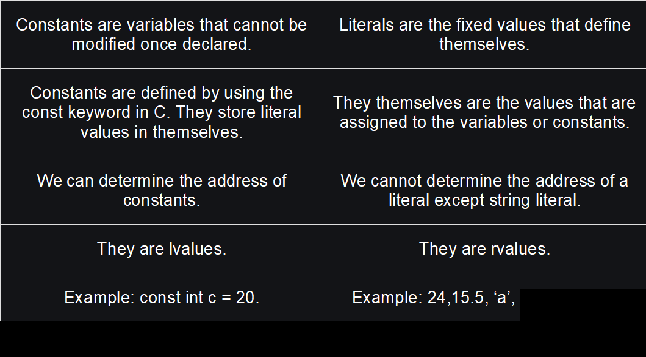- Constants (read only variables)
- The values cannot modified.
- After they have defined we cannot make any changes.
Syntax for declaring constant:
—————————————-
const data_type var_name = value;
Example of constants:
Const int a=5;
Const int a=5; // write way of declaring constant
Const int a;
a=5;
// the above two lines are wrong way of declaring.
Type of constants:
1.integer constants; const int a=10;
2.character constants; const char c=’a’
3.floating point constants; const float f=12.22f;
4.Double precision floating point constants;
double x = 3.141592653589793; // Pi with high precision
double y = -0.000123456789; // Negative double constant
double z = 2.718281828459045; // Euler’s number
5.Array constants
const int arr[] = {1, 2, 3, 4, 5};
6.Structure constants
#include <stdio.h>
struct Point {
int x;
int y;
};
int main() {
const struct Point p1 = {10, 20}; // A constant structure
printf(“Point: (%d, %d)\n”, p1.x, p1.y);
// p1.x = 30; // Error: Cannot modify a constant structure
return 0;
}
Properties of constants in c:
- Constants can be defined during their declaration.
- It cannot be declared separately and later on define.
#include <stdio.h>
int main()
{
// declaring a constant variable
const int var;
// initialization after declaration
var = 30;
printf(“Value of var: %d”, var);
return 0;
}
Constants and literals:

Constants defined by using #define preprocessor directive.
Constants defined with #define act as macros, functioning like constant values.
Unlike regular constants, these are not managed by the compiler. Instead, they are processed by the preprocessor, which replaces them with their specified value before the compilation phase.
#include<stdio.h>
#define A 20
int main()
{
printf(“%d”,A);
}
There are three ways to declare the constants:
1.Using const Keyword:
#include<stdio.h>
#define A 20
int main()
{
const int a=30;
const float b=12.22f;
const double d=12.3345667;
printf(“%d”,A);
}
2.Using Macros
#include<stdio.h>
#define pi 3.14
int main()
{
printf(“%f”,pi);
}
3.Using enum Keyword:
// An example program to demonstrate working
// of enum in C
#include<stdio.h>
# define A monday
enum CalendarWeek{M, Tu, W, T, Fr, Sa, Su};
int main()
{
enum CalendarWeek day;
day = Wednesday;
printf(“%d”,day);
return 0;
}



